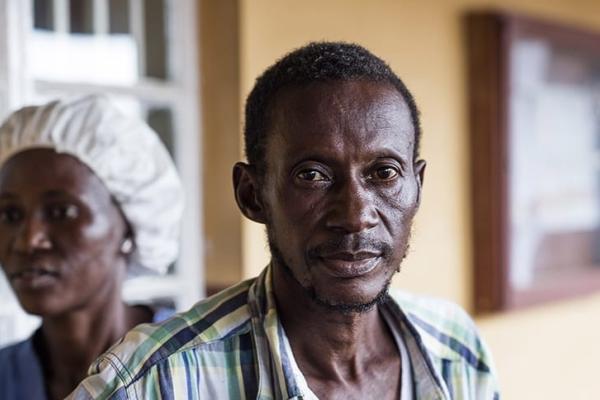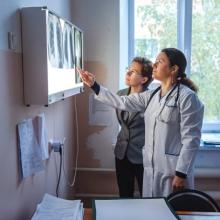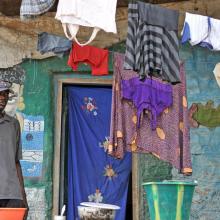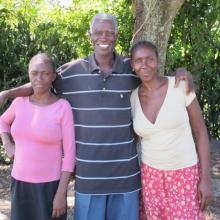The authors of this blog are Prativa Baral, Lissa Murseli, and Zahraa Saab, who are dedicated members of the Partners In Health Canada Spark (PIHC Spark) education group. PIHC Spark is a self-organizing collective of volunteers from across Canada building a movement for global health equity and social justice. PIH Canada Spark believes that all people should have the right to health care and are dedicated to supporting this goal through public education, fundraising and engagement.
It’s the middle of August and you feel the heat scorch your back as you leave the hospital. As you start to think of the long trek home ahead of you, you also start to become more aware of the puncture from the IV drip and how fatigued you truly are. The hospital had all the amenities your home lacked: three meals a day, social support, a clean, well-aerated sleeping space. You were also able to regain some of your strength during that two-night hospital stay. Yet, at home, a number of chores await you, such as tending to your three children, getting that roof fixed, and finding a way to put food on the table over the next few days. One week later, you find yourself back in the hospital. You have overworked yourself because you had no other choice, and your illness is back – stronger than ever.
The reality is that a person cannot easily regain their health if the conditions in which they live, work, grow and age are the very reason for their illness. Even after an individual has received medical attention, their road to healing is long from over; they are still very much susceptible to the social, political, and environmental forces that govern their life, such as poverty. These factors are known to be the social determinants of health, which the World Health Organization deem to be the reason behind the “unfair and avoidable differences in health status seen within and between countries”.
Poverty and the experience of illness are two sides of the same coin. Often, a person facing poverty is overstrained from working, might live in unsuitable housing conditions, and may be unable to have a healthy, well-rounded diet. As a result, they are much more likely to fall ill. When they do get sick, they are much less likely to access healthcare services because they are unaffordable or out of reach. However, by delaying medical care, an individual is further plunged into illness.
Even if an individual has received medical care, the medication they have to take may be unaffordable, especially if they are unable to work by virtue of being sick. The lack of income can also compound daily stressors, such as worries about having enough money to purchase food or to arrange for transportation to medical appointments. These financial burdens not only put the sick person at a disadvantage, but their families and dependents suffer as well.
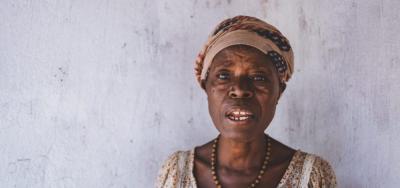
Christiana Finda Biango, was identified as a vulnerable patient in need of urgent financial assistance. During her treatment for HIV and TB, PIH further supported Christina with food and helped repair her home. With the support she received, Christina was able to complete her treatment for TB and move back into her home.
Doug Miller / Partners In Health
PIH recognizes that poverty is often at the root of illness, and therefore, that fighting poverty means fighting disease. To address this, PIH employs a holistic approach that provides patients with more than just health care services. It aims to remove the obstacles that prevent patients from receiving care, and address the external factors that influence their recovery. How so? By providing select patients in extreme poverty with cash stipends to support them with everyday expenses and by investing in community-based programs.
These two approaches are being put into action in Sierra Leone, which, to this day, is reeling from the 2014 Ebola breakout. The epidemic caused Sierra Leone’s already fragile healthcare system to collapse, introduced an economic crisis, and weakened the country’s social infrastructure. As a result of this, the people of Sierra Leone greatly suffered, and falling ill became just one of the many life stressors that people face.
Taking this into consideration, PIH not only provides access to necessary healthcare services, it also takes a poverty-reduction approach to improving the well-being of Sierra Leoneans.
Though a seemingly simple form of support, the cash stipends that PIH provides allows patients to focus on their healing and ensures that the basic needs of their families are met, despite the lost income due to illness. The PIH team selects the patients with the greatest need, identifying those who will benefit the most from the financial support. This means that patients in remote locations can arrange for transportation to health centres to receive regular medical attention. This also means that patients and their families have continued access to nourishing food and can improve their housing conditions. Most importantly, this means that patients facing poverty are reassured that they are not alone in their journey to recovery.
In addition to cash transfers, PIH trains and employs locals as community health workers to efficiently deliver healthcare services to those who need it the most. PIH also provides communities with social support by restoring health services, investing in adult literacy programs, and developing agricultural training programs. PIH provides scholarships to the children of patients and has created financial literacy programs for locals as well. In doing so, PIH recognizes that health is not just confined to the walls of a healthcare facility; it is greatly shaped by a person’s environment and life circumstances. Thus, by focusing on the economic growth of not only the individual, but the community as a whole, PIH aims to break the vicious cycle of poverty and illness, especially in many of the conflict-heavy countries that it supports.
Ultimately, the support provided by Partners in Health recognizes that patients need more than just medicines and adequate medical attention to support health and well-being. They also need, and deserve, the financial means to secure access to food, clean water, and housing. In turn, ensuring that basic needs are met through practical and adequate support provides patients with peace of mind – invaluable on their road to recovery to good health.
